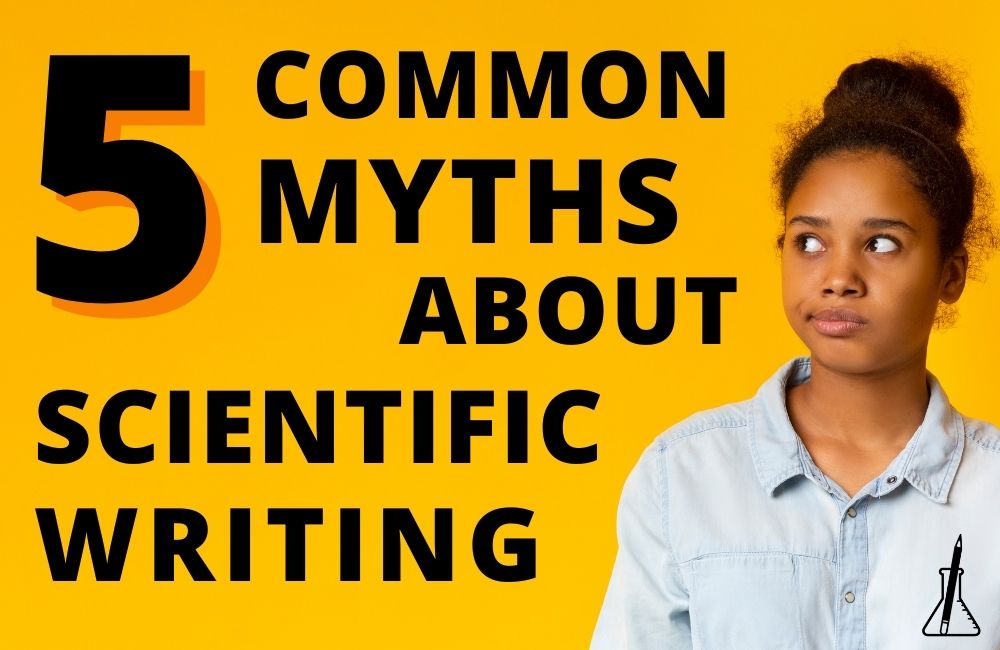I recorded a podcast episode on 5 common myths about scientific writing – why they’re not true and how believing them can set you up for failure. If you prefer, you can watch the YouTube video above or listen to it on Apple Podcasts or Spotify.
When talking to scientists – be it clients, friends, former colleagues, or people on social media – I keep coming across a few false beliefs about writing papers, again and again. Which is a shame because those assumptions can actually hinder you from becoming an excellent (and happy!) scientific writer.
So, let me walk you through them and explain how you should think about each topic instead:
Myth 1: You need to be a native English speaker to write articles that get published in high-ranking journals
If English is your mother tongue, you are undeniably at an advantage: You won’t need to learn another language’s words and grammar as a prerequisite to get your work published. But that doesn’t mean that every native speaker automatically knows how to write – let alone how to write scientific papers. Writing is a different skill than being proficient in English and academic writing is yet another skill. Therefore, academic writing is a craft every researcher has to learn and practice before becoming good at it.
As someone whose first language is English, you will probably struggle less finding the right place for a comma. But writing well doesn’t only mean using words and punctuation in the correct way. A well written paper also needs to be well structured and ideally tell a concise story.
On top of that, being a native speaker can even complicate things. You might be prone to using unnecessarily long and complicated sentences, as well as words that scientists from other parts of the world don’t understand.
Myth 2: Storytelling covers up holes in your research
I sometimes hear this criticism that storytelling is just a tool to make weak research look better. And I actually think I understand why this myth has evolved. A “story” can mean so many different things, and one of its meanings is to invent something. But that isn’t its only definition!
A story means simply giving the reader context. It’s a way to clarify the motivation for and the significance of your research. When you start using the Scientific Storytelling Framework that I teach in my online course and workshops, you’ll see how identifying the story of a paper will help you uncover holes in your research rather than fill them.

Myth 3: You need to use complicated English to sound like an expert
The one essential thing that decides the fate of your article is whether you have been understood or not. Using complicated language is one sure way to confuse your readers. Your readers don’t know your research as well as you, and they aren’t willing to invest a lot of time trying to understand what you mean. Therefore, using complicated English doesn’t impress your readers, rather, it frustrates them. They are more likely to stop reading your paper or proposal altogether when they have to pause frequently to be able to follow your train of thought.
Therefore, my scientific writing “mantras” are simplicity and clarity. Don’t shy away from short sentences, simple words and repeating yourself. This is the way to actually impress your readers (and peer-reviewers).
Myth 4: Hiring a scientific editor to correct the English is all you need when you struggle with writing
Are you not effective at communicating your research? Are you not quite sure how to compress your research into a concise article? Or do you keep getting rejected by high-ranking journals?
Let me tell you, hiring an external editor to proof-read your article won’t be sufficient. First of all, most editors only focus on the language of your paper. They’ll correct your English and make sure your writing is succinct (if you find a good one!). But very few editors actually tackle the underlying structure and story of your paper, especially when you hire someone with a linguistic instead of a scientific background.
Having your paper tell one clear and concise story is actually the thing that gets you published!
Apart from that, having to rely on other people to edit your manuscripts before you submit them isn’t a long-term solution. Sure it can be a quick fix when you’re in a pinch, but actually investing in training and learning this skill that is academic writing will pay off for the rest of your career.
Think about how much time you could save once you have a system for writing clear and concise papers that you could use every time!
Because when you think about it, most researchers have never been formally trained in writing. Proper scientific writing training that goes beyond linguistics and into the nitty-gritty of how to write a scientific paper, step by step, is so rare. (That was actually my motivation for creating the Researchers’ Writing Academy, because that’s exactly what you’ll learn inside!).
Myth 5: Writing papers is slow and frustrating
If you scroll through Twitter or Instagram or listen in on conversations in your departmental coffee room, you will most likely hear scientists complaining about the writing they have to do. It seems to be generally accepted that writing is an unwelcome chore one has to do after actually having done the research.
You know what? It doesn’t have to be like this! I see it again and again with researchers who have become a members of the Researchers’ Writing Academy and who have implemented the systems we teach in the course. They report that they started to experience flow during their writing and that writing a paper is now a lot faster for them. Through the Scientific Storytelling Framework we teach (see myth #2), many also get excited about their paper again. Seeing the bigger picture can help you see how interesting your results actually are! What gladdens me most is to hear how for so many, writing has become enjoyable and suddenly feels easy.
What’s the secret, you ask? It’s having a system for writing a clear and concise paper, step by step, that incorporates your co-authors into the process. If you want to get an overview of the system we’re teaching in the course, we invite you to watch our on-demand training.
If you want to advance in your academic career, writing papers will have to be a part of it, and wouldn’t it be better if that was enjoyable and fast for you? 😊
There you have it: 5 commonly held beliefs about scientific writing that I don’t believe are true. What do you think? Do you agree? Let me know in the comments below!







